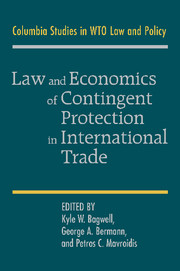Book contents
- Frontmatter
- Contents
- Contributors
- Introduction
- 1 An Overview of the Agreement on Subsidies and Countervailing Measures – Including a Discussion of the Agreement on Agriculture
- 2 Do the World Trade Organization Disciplines on Domestic Subsidies Make Sense? The Case for Legalizing Some Subsidies
- 3 Subsidies and Countervailing Measures: Determining the Benefit of Subsidies
- 4 The Enduring Problem of World Trade Organization Export Subsidies Rules
- 5 The Boeing–Airbus Dispute: A Case for the Application of the European Community State Aid Rules?
- 6 Antidumping: Overview of the Agreement
- 7 Price Differentiation in Antitrust and Trade Instruments
- 8 Nonpreferential Origin Rules in Antidumping Law and Practice
- 9 The Appellate Body Interpretation of “Sunset Reviews” Provisions of Anti-Dumping and Countervailing Measures Agreements: A Critical Analysis
- 10 The Safeguards Agreement – An Overview
- 11 Why Are Safeguards Needed in a Trade Agreement?
- Index
- References
9 - The Appellate Body Interpretation of “Sunset Reviews” Provisions of Anti-Dumping and Countervailing Measures Agreements: A Critical Analysis
Published online by Cambridge University Press: 03 May 2010
- Frontmatter
- Contents
- Contributors
- Introduction
- 1 An Overview of the Agreement on Subsidies and Countervailing Measures – Including a Discussion of the Agreement on Agriculture
- 2 Do the World Trade Organization Disciplines on Domestic Subsidies Make Sense? The Case for Legalizing Some Subsidies
- 3 Subsidies and Countervailing Measures: Determining the Benefit of Subsidies
- 4 The Enduring Problem of World Trade Organization Export Subsidies Rules
- 5 The Boeing–Airbus Dispute: A Case for the Application of the European Community State Aid Rules?
- 6 Antidumping: Overview of the Agreement
- 7 Price Differentiation in Antitrust and Trade Instruments
- 8 Nonpreferential Origin Rules in Antidumping Law and Practice
- 9 The Appellate Body Interpretation of “Sunset Reviews” Provisions of Anti-Dumping and Countervailing Measures Agreements: A Critical Analysis
- 10 The Safeguards Agreement – An Overview
- 11 Why Are Safeguards Needed in a Trade Agreement?
- Index
- References
Summary
Introduction
The World Trade Organization (WTO) Anti-Dumping (AD) Agreement and the Agreement on Subsidies and Countervailing Measures (SCM Agreement) require that AD duties and countervailing measures (CVMs) be terminated no later than five years from their imposition unless domestic authorities determine, with a specific review initiated before the mentioned deadline, that the expiry of the duty would likely lead to continuation or recurrence of dumping (or subsidization) and injury. If domestic trade authorities terminate the review with a negative determination of likelihood, either with respect to dumping (or subsidization) or injury, the duty expires (sunset).
However, the WTO sunset reviews rules provided in Article 21.3 of the SCM Agreement and in Article 11.3 of the AD Agreement are vague and do not accurately regulate all of the complex aspects of the sunset reviews procedure. Indeed, in both agreements, the text of the articles regulating the sunset reviews was the result of complex negotiations, and the provision of an expiry deadline was an absolute novelty, as before the Uruguay Round there were no rules providing for the termination of AD and countervailing duties within a predetermined deadline. The relevant articles in the AD and SCM Agreements provide only a generic discipline, which is only partially complemented by the rules applicable to basic proceedings. Indeed, Article 11 of the AD Agreement and Article 21 of the SCM Agreement make a reference, respectively, to Article 6 of the AD Agreement and to Article 12 of the SCM Agreement regulating the procedural part of the sunset reviews.
- Type
- Chapter
- Information
- Publisher: Cambridge University PressPrint publication year: 2009



